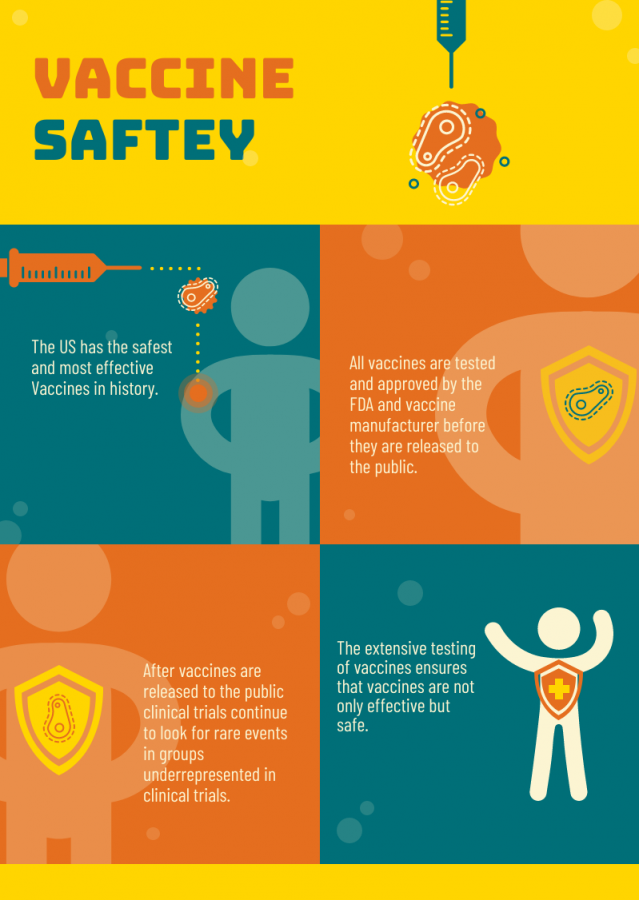Truth about vaccines
The importance of immunization in society
info-graph by Annabelle Harshbarger
This infographic talks about the measures taken to ensure vaccine safety. Before vaccines can be released to the public extensive clinical trials take place. All vaccinations are tested and approved by the FDA and vaccine manufacturers.
January 16, 2020
Vaccines are one of the most important medical inventions, but in recent years vaccine uptake has decreased. Vaccinations prevent dangerous and even deadly diseases by developing immunity. Vaccinations put an imitation of a virus into the body helping the immune system build a response, but this limitation cannot cause actual illness.
The effects of vaccines show why they are so crucial to public health. Many infectious diseases such as polio and diphtheria have been almost completely eliminated in the US because of vaccines. According to the History of Vaccines before the measles vaccine was introduced in 1962 there were approximately four million cases a year. This dropped dramatically in the following years.
In recent years outbreaks of many dangerous diseases have happened across the US. According to the Centers for Disease Control and Prevention there were 1,282 reported cases of measles in 2019, this is the highest number of cases since 1992. Outbreaks are more likely to happen in communities where large groups of people are unvaccinated.
When large groups of people in communities are not vaccinated herd immunity cannot be accomplished. Herd immunity is the protection from contagious diseases an individual has if they live in a community of highly vaccinated people. This is especially important for people who cannot receive vaccinations. But as the number of unvaccinated individuals increases the effect of herd immunity decreases.
When people rely on herd immunity they are putting people such as the elderly, those with weaker immune systems or people who are allergic to vaccinations at risk.
The anti-vax trend is nothing new, people have opposed immunization since the first small-pox vaccine was introduced in the 1800s. Many anti-vax parents claim that the risks of vaccines outweigh the pros. According to Healthline many parents believe that the flu vaccination can give their children the flu, however this is not true. One of the biggest myths about vaccinations is that they are connected to Autism.
According to the CDC, some parents fear that an ingredient called Thimerosal may be connected to Autism Spectrum disorder. Thimerosal is used to prevent the growth of bacteria in vaccines, and passes through the body quickly however, some patients do get allergic reactions. Thimerosal has been taken out of almost all vaccines except for some flu shots. Studies show that there is no connection between vaccinations and ASD.
A study done by The Journal of Pediatrics in 2013 concluded that there was no increased risk of ASD after vaccination.
When people are unvaccinated they are putting public health at risk. If they were to contract a dangerous disease it could spread to people with weaker immune systems or those who cannot be vaccinated due to medical reasons.
When people make the choice to vaccinate themselves and their children they are making the choice to help public health. As society continues to vaccinate we will continue to eliminate dangerous diseases leading to a healthier society.







